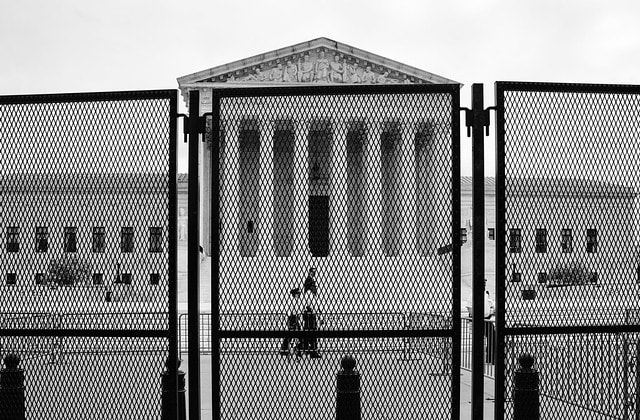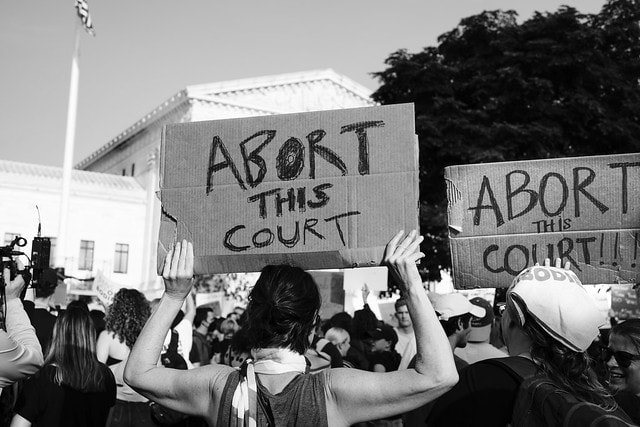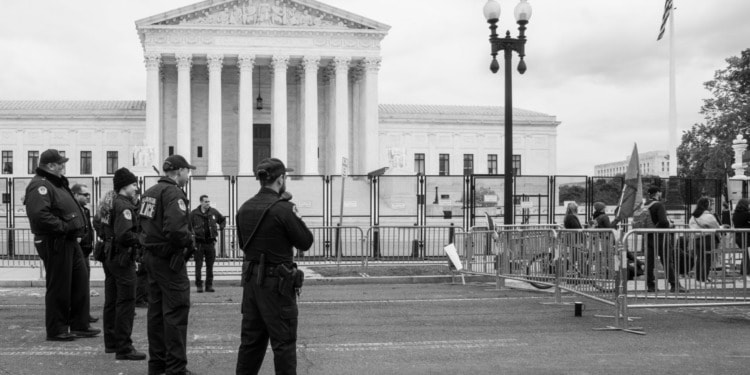The Supreme Court’s nine justices are set to meet for their first private conference since the jarring leak of a majority draft opinion overturning Roe v. Wade last week, signalling the death rattle of abortion rights in at least half the states.
The unauthorized publication of the highly sensitive document provoked an avalanche of public criticism and outrage from abortion rights defenders, with angry protests occurring across the country, including in front of some justices’ homes.
Abortion clinics amp up their security measures as they fear violence from anti-abortion groups, and anti-abortion headquarters like the so-called crisis pregnancy centres (which essentially seek to dissuade their visitors from getting an abortion) have come under attack.
Chief Justice John Roberts confirmed the authenticity of the opinion, redacted in February as part of the Mississippi abortion case, and ordered the court’s marshal to investigate the source of this unprecedented leak.
The incident constitutes “one of the greatest crises in modern Supreme Court history” and has created a climate of general suspicion that will certainly add tension and difficulty to the court’s deliberations.
“This is the most serious assault on the court, perhaps from within, that the Supreme Court’s ever experienced,” said a person working closely with the court’s conservatives, who chose to remain anonymous. “It’s an understatement to say they are heavily, heavily burdened by this.”
The weekly Thursday meetings usually present justices with the opportunity to settle their opinions on cases they’ve heard and choose which cases they will be hearing over the coming months.
As Alito’s majority draft opinion remains the only one to have been circulated, and the conservative justices seem determined to confirm their initial vote, it appears almost certain that Roe v. Wade will be overturned by the end of June.

Senate fails to pass bill codifying Roe v. Wade
Yesterday, Wed. 12 May, the Senate rejected a largely symbolic effort from Democrats to pass a bill on abortion rights in a 49-51 vote that saw all Republicans and one member of the Democratic party, Senator Joe Manchin, vote against the legislation, despite claiming he supports abortion rights. This is not the first time that Senator Manchin goes against the Democratic party line, as he notoriously shares a range of conservative opinions, including regarding energy policies and climate change since he has vested interests in fossil fuels, especially coal-mining which is a major industry in his state, West Virginia.
Manchin’s vote, of course, made the difference, ensuring the bill would be killed. He was, once again, true to his reputation as the “swing vote” in the Senate.
Back in February, a similar attempt at advancing the legislation on abortion rights had also failed, making this second rejection an expected outcome, although Democrats hoped the leak from the Supreme Court and the materialisation of a pending end to abortion rights would have motivated more senators to enshrine Roe v. Wade in law.
“Today’s vote is one of the most consequential we will take in decades because for the first time in 50 years, a conservative majority, an extreme majority on the Supreme Court, is on the brink of declaring that women do not have freedom over their own bodies,” Democratic Leader Chuck Schumer said in a speech on Wednesday. He later added that the decision “will live in infamy.”
The failed vote exemplifies the difficulties faced by Democrats in a 50-50 Senate. The Republican Senators known to support abortion rights, like Susan Collins and Lisa Murkowski, opposed the Democratic bill on account that it is too expansive.
The Democratic legislation proposed to do more than simply codify Roe v. Wade, proposing to ban states from implementing many kinds of abortion restrictions that are currently allowed under Roe and are deemed “medically necessary,” such as mandatory waiting periods and onerous building requirements for abortion clinics. These are known as TRAP laws, acronym for Targeted Restrictions on Abortion Providers, and aim at restricting access to abortion by imposing burdensome standards on abortion providers.
Collins and Murkowski have come up with their own legislation on abortion rights, but Democrats dismissed it because of its vague definition of what constitutes an unconstitutionally “undue burden” on people seeking an abortion, threatening to plunge the country into “the same chaos in the courts that we see now,” said a Senate Democratic aide.

Chief justice Roberts in the eye of the storm
While the Senate fails to enshrine Roe v. Wade in law, the Supreme Court gives no sign that it is flinching from its initial decision to overturn the 1973 precedent by the end of June.
After the leak, Chief John Roberts came under close scrutiny from the public and media as his position regarding Alito’s opinion draft is unclear. There is a possibility he could lobby one of the five Republicans presently on the side of Alito’s opinion in an attempt to avoid overruling Roe v. Wade. However, past declarations strongly suggest Roberts will support the state of Mississippi in the Mississippi abortion case currently before the court, Dobbs v. Jackson Women’s Health Organization, therefore upholding Mississippi’s ban on abortion under 15 weeks of pregnancy.
Such ruling would still considerably weaken Roe v. Wade as it could incentivise other states to curtail abortion rights.
Related articles: Roe v. Wade Overturned in Preliminary Vote by US Supreme Court, Leaked Document Reveals | How Abortion Could Shape the US Midterms
Although Roberts is a conservative, he is known for having sided with the court’s liberals multiple times in the past, which isn’t necessarily a good sign as it was suggested that Roberts hence lost his power of persuasion over members of his own party.
“There does seem to be some bitterness among the other justices,” said Curt Levey, a conservative attorney and veteran of several Supreme Court confirmation battles. “There probably was a time when Roberts could’ve convinced one of the other conservative justices [in the pending abortion case.] He might well have succeeded in that a few years ago… Maybe this is the ultimate payback that in the most controversial of all cases and the biggest threat to the legitimacy of the court that he no longer has the persuasive power.”
More rights expected to come under attack after Roe v. Wade is overturned
The pending repeal of abortion rights nationwide, which until now fell under the constitutional right to privacy, will bring about further bans on other rulings that belong to the same category. Certain kinds of contraception are particularly at risk as the Mississippi governor recently refused to rule out attempting to ban IUD (intrauterine device) and morning-after pills once Roe v. Wade is overturned.
Mississippi is one of the 12 American states with so-called “trigger laws” banning abortion that would immediately come into effect the moment Roe v. Wade officially falls. As Mississippi’s legislation plans to hold the fertilised egg as a legal person, contraception products like IUD and emergency pills, which operate by blocking the implantation of the fertilised egg in the uterus, will be prohibited.
Many activists worry the so-called pro-life legislation will lead to a de facto criminalisation of the female body itself as natural miscarriages, which represent the outcome for 1 in 4 pregnancies, will become suspicious and be investigated as possible illegal abortions.
People stop going to get help when there is a risk they will go to jail for it. That is how people die. When you criminalise abortion, you criminalise every person able to get pregnant, and you put everything about them under scrutiny. They stop being human, and just become uteri
— jannekeparrish.bsky.social (@JannekeParrish) May 9, 2022
As I write, Louisiana (another state with “trigger laws”) is debating a bill that would make women and girls who get abortions subject to criminal prosecution and prison. Danny McCormick, the Republican Representative pushing the bill, justified his position by saying that a situation where a woman gets an abortion should be the legal equivalent of that in which a woman kills her child after birth.
As such rulings deprive a large part of the American population of their bodily autonomy, putting them at risk of devastating stigmatization, the overturning of Roe v. Wade would constitute a violation of the international human rights law.
The repercussions could reverberate across the world in a disastrous manner, incentivizing anti-abortion groups in the UK and in Europe to undertake similar projects – or they could make the United States an outlier of abortion rights, and motivate other countries to secure their own legislation.
Moreover, a knock-on effect can be expected at the United Nations and for developing countries. While Roe v. Wade does not have a direct impact on US foreign policy, its overturn would send a strong signal about the US’ position on reproductive health care. In particular, it would put an end to any American funding of projects to improve the quality of and access to comprehensive sexual health and education programs, including safe abortions, in low- and middle-income counties – known as sexual and reproductive health rights (SRHR) and enshrined in Sustainable Development Goal # 5 (Gender Equality).
In the event of US withdrawal from the sector, the global community will need to step up to fill the funding gap as they did when the US slashed funding for SRHR under the Trump Administration.
Funding cannot stop: The numbers for people around the world are dire. There are 111 million unintended pregnancies each year resulting in 30 million unplanned births, 69 million abortions (of which 35 million are unsafe), 12 million miscarriages, and one million stillbirths.
The people’s awareness of the threats currently posed to bodily autonomy, their collective actions, and political decisions will be key to ensuring the long-term protection of sexual and reproductive health rights in the future both in America and in the rest of the world.
Editor’s Note: The opinions expressed here by Impakter.com columnists are their own, not those of Impakter.com — In the Featured Photo: Protesting the draft decision overturning Roe at the Supreme Court on Mother’s Day. Featured Photo Credit: Victoria Pickering/Flickr.














